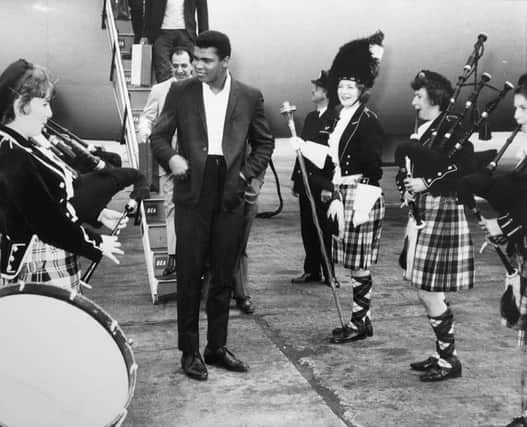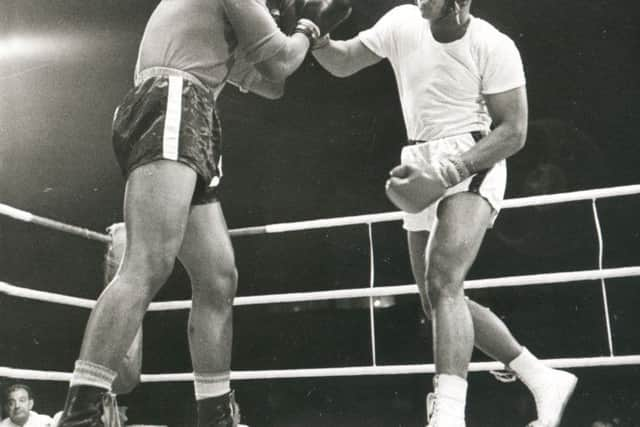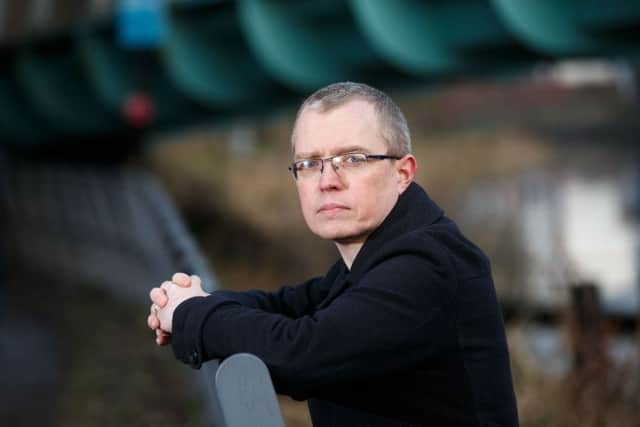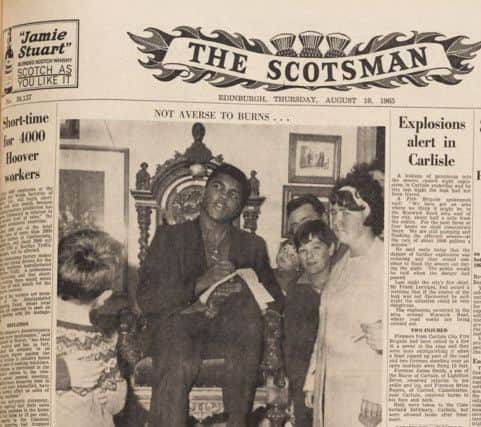How Muhammad Ali's '˜forgotten' Paisley fight inspired a play


Stand-up comedian turned playwright Alan Muir was already working on a script about a cantankerous pensioner seeing out his twilight years in a care home. The author knew Jimmy Marshall had “an amazing tale in him”, but was struggling to find that magic elixir that would bring it to life, until the Ali fan discovered the story of his hero’s visit to Scotland in 1965. And so The Greatest was born which will debut to audiences next month at Glasgow’s A Play, A Pie and a Pint spring season.
“I couldn’t believe it when I discovered Ali not only visited Scotland in 1965 – he’d fought here when he was Heavyweight Champion of the World,” Muir says.
Advertisement
Hide AdAdvertisement
Hide Ad“It seemed incredible and also a slice of history that had largely been forgotten.


“The more I found out about his visit to Scotland in August of that year, the more I knew I had to write about it. I uncovered lots of lovely fragments and memories – many of which feature in the play.”
Here’s what we do know. Ali definitely visited Scotland in 1965 when the Scottish flyweight legend Peter Keenan, by then a promoter teamed up with the London fight impresario Micky Duff to stage an exhibition bout at the now defunct Paisley Ice Rink. Ali was 23 and at the height of his fame, having just won his world title rematch against Sonny Liston, courtesy of the now infamous “phantom” punch, a few months earlier. He was already a controversial figure, having ditched his “slave name” Cassius Clay and embraced the Nation of Islam after first defeating Liston to become World Heavyweight champion a year earlier. But Clay was how he was still widely referred to in these days and even the promotional poster for the exhibition bout in Paisley had the former moniker emblazoned across it, with Muhammad Ali in smaller print. His opponents were the American heavyweight Jimmy Ellis, who would later become world champion, and Cody Jones. Ali was piped off his plane on arrival in Glasgow Airport and visited hospitals and Celtic Park on a promotional blitz. But just 1,000 turned up to the fight in Paisley and they weren’t impressed with what they saw as Ali went through the motions. When the crowd started booing, the young champion had had enough and stormed out of the ring and straight to the airport demanding to be put on “the first flight outta here.”
Not the most auspicious basis for a re-imagining of a forgotten vignette of Scottish history, but Muir wondered if there was something else afoot in Ali’s listless demeanour on the night and weaves this into a meeting with the young Jimmy Marshall.
“I’ve always been fascinated by Muhammad Ali,” Muir says.


“He was The Greatest in many senses – a self-propelled champion, icon and trailblazer – both in and out of the ring – but he was also a man of contradictions. He stood up for his beliefs on civil rights and the Vietnam War. On the other side of the coin, his views on women were disappointing and he could be as cruel with his tongue as he was with his fists. At the end of the day, he was a human being with the foibles we all carry. But ultimately he remains an inspiration to me.”
The idea also struck a chord with the producers of Glasgow’s world-renowned A Play, A Pie and a Pint series who loved the hitherto unknown playwright’s story and quickly snapped it up for their spring season.
“It’s a cracking story which should have wide appeal,” says artistic director Morag Fullarton.
“Ali was an iconic sportsman and a larger-than-life personality – achieving worldwide acclaim and fame as a professional boxer and activist. An inspiring and controversial figure, the little-known story of his visit to Scotland in the 1960s is a fascinating one.”
Advertisement
Hide AdAdvertisement
Hide Ad

The drama centres on Jimmy’s claim to have “knocked out” Ali during the great man’s Scottish trip. While roundly dismissed by staff at his care home, the chance arrival in his room one day of a young video blogger Orwell, and the unlikely kinship which forms between the pair, brings a fresh look at events surrounding Ali’s visit. Audiences are never quite sure whether the confrontation took place which leaves a sense of intrigue hanging over the tale. But it’s as much about the generational gap between the two protagonists and how this is slowly bridged. Orwell’s life of roller derby and self-produced YouTube channels at first seems a world away from Jimmy’s gruff temperament and lament over a solitary life now winding down, but they come to realise they’re really just two people who need a friend.
The former journalist, who lives in Cumbernauld with wife Amanda and sons, Jack (14) and Ben (12) uses his background in comedy to pack the dialogue with sharp one-liners which provide a balance between the melancholic moments and some pretty broad Scots humour. He spent the past four years performing on the Scottish stand-up circuit, before stepping back from the microphone to focus on his play.
“I love the writing process – honing a joke is challenging and fun – but actually performing? Not so much. I’m too neurotic to relax in a live situation,” he says.
“The fantastic thing about writing a play is losing yourself and finding someone else’s voice. Once I know the characters I just let them speak to each other – while I write down their conversations like some kind of creepy cosmic eavesdropper.”


Ali isn’t the only real life character to feature in this spring’s A Play, A Pie and a Pint season at Oran Mor in the city’s West End. The story of the William Topaz McGonagall, the Dundonian proclaimed to be the “world’s worst poet” also features in McGonagall’s Chronicles (Which Will Be Remembered For A Very Long Time). The fondly remembered Scots comedian Chic Murray casts a comic reflection over his life in Chic Murray: Funny Place For a Window, while Where’s Lulu? explores an identity crisis suffered by the singer ahead of her victorious performance at the 1969 Eurovision Song Contest.
Star crime writer Val McDermid turns her pen to politics with a play about a young “Yorkshire lass” joining the campaign for Scottish independence in Margaret Saves Scotland, while legendary Just Another Saturday writer Peter McDougall returns with the Vampire Clinic.
Fullarton added: “This season of PPP offers 16 world premieres and includes plays by first time playwrights as well as experienced writers – and many more terrific writers – exploring such wide-ranging subjects as arranged marriages, surprising funeral arrangements and the hidden tensions of a wedding choreographer.”
The Greatest is being staged at this spring’s A Play, a Pint and a Pint season at Glasgow’s Oran Mor from 12-17 March, playpiepint.com